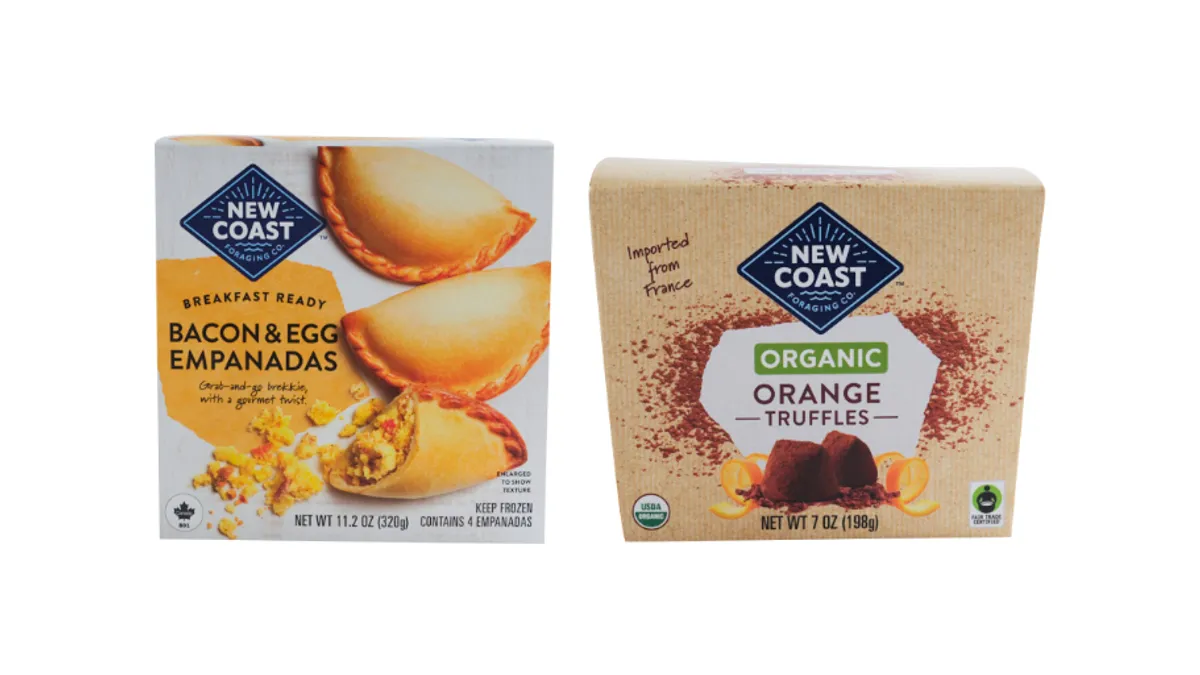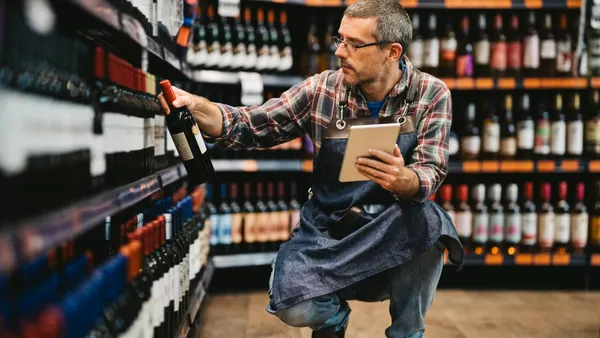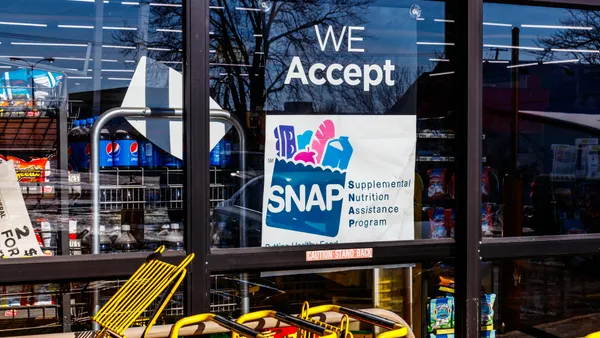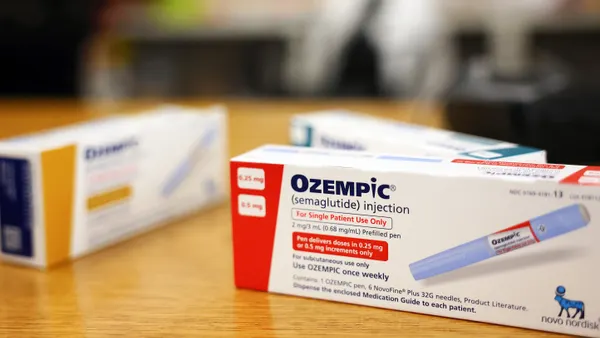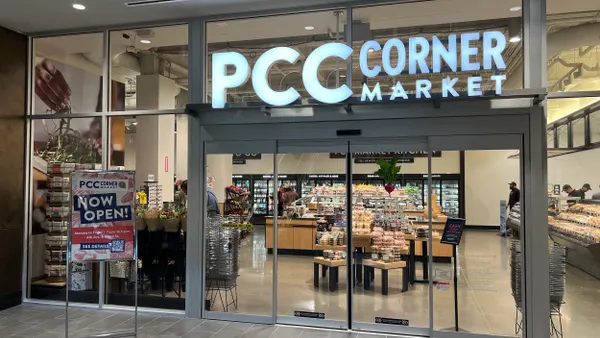West Coast grocery operator Good Food Holdings has begun unfurling its first company-wide private brand line.
Called New Coast Foraging Company, the line debuted at the end of 2023 and additional products are slated to arrive throughout this year, said Good Food Holdings CEO Neil Stern. The first products released were empanadas and truffles.
Good Food Holdings runs about 50 supermarkets in Southern California and the Seattle and Portland, Oregon, areas, under five banners: Lazy Acres Natural Market, Metropolitan Market, New Seasons Market, Bristol Farms and New Leaf Community Markets. While the banners already have their own private brands that focus on premium or local products, New Coast is looking to fill the rest of shoppers’ baskets with “polished basics,” Stern said.
The name plays on Good Food Holdings’ “coastal brand” and the perception that foragers are scouring the world to find unique and differentiated products, Stern said.
“It's gonna be basics with a twist,” Stern said. “We're trying to get some things that you're not going to find on everybody else's shelves.”
Take the empanadas, for instance: “We're not trying to create the most premium product in the world, but we are trying to have something that you may not find everywhere else in the marketplace.”
With New Coast, Good Food Holdings is looking to keep customers who would have traded out of its stores by giving them a chance to trade down, said Elizabeth Strydom, vice president of private label and purchasing at the holding company.
The rollout of New Coast comes at a time when private label has soared in popularity with grocery shoppers. High food prices have helped push consumers toward store brands. Private label’s reputation has also shifted over the years from shoppers viewing it as a cheaper, lower-quality option to an affordable alternative that’s on par with — or even better than — name brands.
Ninety percent of survey participants last year said they would be somewhat or very likely to keep buying store brands if inflation or grocery prices come down, according to FMI – The Food Industry Association research.
“Private label is now sexy in the grocery industry,” Strydom said.
Telling a story
The philosophy around building the New Coast portfolio centers around four qualifications: offering basic products with a twist, providing adventure shopping with unique and differentiated items, helping customers do a full grocery shop and telling stories about products and vendors.
A product has to meet some but not necessarily all four, Strydom said.
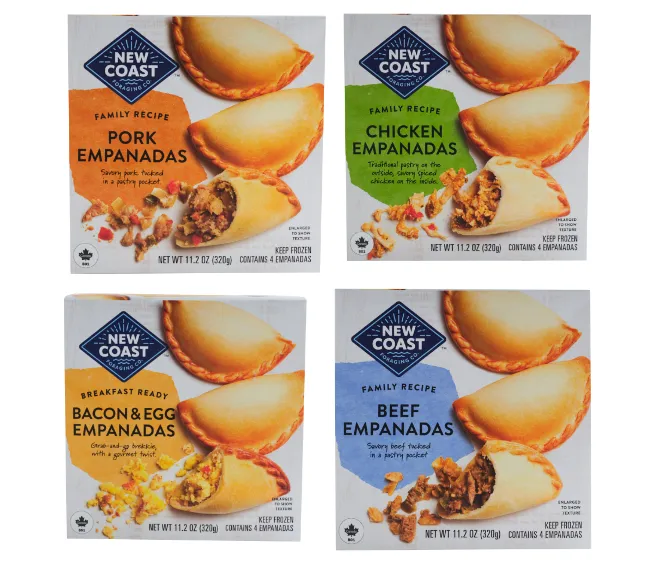
The empanadas, for example, satisfy three out of the four sourcing approaches as a “polished basic,” unique item and one with an interesting vendor story, Strydom said.
The empanadas use a recipe from a family that lives in Toronto and originally hails from Paraguay, where empanadas are a staple, Strydom said.
Good Food Holdings found the supplier through the Retail Innovation Council, of which Strydom is a board member.
New Coast has four empanada SKUs: chicken; beef; pork; and bacon and egg, Strydom said.
Private label sourcing struggles
Stern said that New Coast products may replace some banner-specific private label items as the company looks to take advantage of the benefits of scale.
New Coast’s truffles, which are organic and imported from France, illustrate both those points. New Seasons already offered the truffles, but was going to lose the SKU because the supplier raised its minimum run requirements, Strydom said.
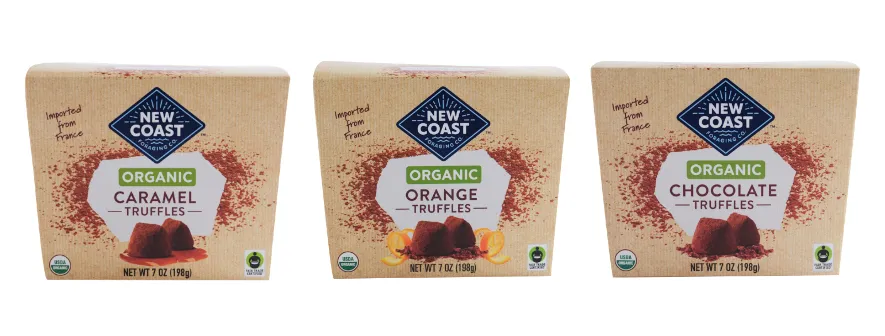
Bringing the truffles under New Coast allowed Good Food Holdings to keep that supplier relationship and expand from just the chocolate SKU to also include caramel and orange, Strydom said.
As a mid-sized company, Good Food Holdings works with a lot of small- and mid-size suppliers, which has led to the grocery operator becoming a mentor as it helps the vendor community grow, Strydom said.
“Our team has taken on that mentorship role of, ‘Okay, so you want to do private label — do you understand that this is going to be your responsibility, this is going to be our responsibility, this is what we're going to expect of you?’” Strydom said.
Ups and downs of packaging
Good Food Holdings wanted to have the packaging convey the “voice” of New Coast as a humoristic foodie, Strydom said. The tops of the truffle packages, for example, instruct customers to “Open here for your bliss.”
To develop the packaging for New Coast, Good Food Holdings worked with San Francisco-based design firm Plant Creative, Stern said.
Some of the challenges Good Food Holdings faced included figuring out how to stand out not just on the shelf overall but within specific categories and providing sustainable packaging, Stern said. Creating templates to design with speed, accommodating quick product rollouts and signifying attributes such as organic, plant-based and gluten-free, have also been top of mind, he noted.
The company also factored in input from its banners’ CEOs. “The CEO of Metropolitan Market always says: If I put the packaging on the table, give me something interesting to read,” Strydom said.
What’s next for New Coast
Good Food Holdings is aiming to get hundreds of SKUs in the market this year under the line with an initial focus on snacks and frozen products, Stern said. Nine frozen pasta main dishes will launch towards the last week of February.
“We wanted to launch with a product that was a little bit different than what's out in the marketplace,” Stern said about the empanadas.
Upcoming items include frozen vegetables, french fries, pizzas, ravioli, gnocchi, frozen fruit and smoothies, Stern said.
In developing the product line, Good Food Holdings is looking to capitalize on prominent food trends.
The company is tapping its existing international suppliers, Strydom said, noting that volume constraints pushed the company to establish relationships with suppliers abroad who see Good Food Holdings as their entry point into the United States. Products launching from now to June have an “international flair” with items from France, Italy and Canada, Strydom said, adding that customers will see in the future products from the U.S. as well.
Stern said in an interview at the end of last year that private label will likely play a “big part” in grocers’ efforts to drive value — a term he defines as being about more than just opening price points. New Coast is aiming to do just that.
“[We] want to have some really interesting products at really great prices for the consumer,” Stern said.



